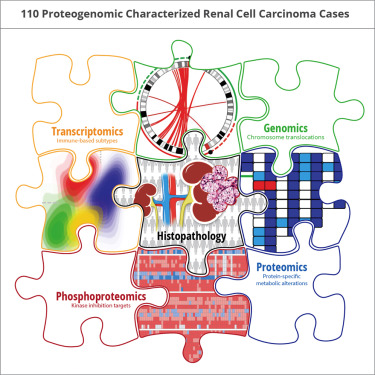Investigators with the  Clinical Proteomic Tumor Analysis Consortium (CPTAC) have generated the most comprehensive multi-omics dataset for clear cell renal cell carcinoma (ccRCC), the most commonly diagnosed kidney cancer subtype. The investigators used integrative proteogenomics, to reveal new insights into kidney cancer.
Clinical Proteomic Tumor Analysis Consortium (CPTAC) have generated the most comprehensive multi-omics dataset for clear cell renal cell carcinoma (ccRCC), the most commonly diagnosed kidney cancer subtype. The investigators used integrative proteogenomics, to reveal new insights into kidney cancer.
The new study, a comprehensive analysis of 103 prospectively collected, treatment-naïve ccRCC tumors and 80 paired normal adjacent tissues, identified dysregulated cellular mechanisms uniquely revealed at the protein level and impacted by genomic and transcriptomic alterations. Investigators analyzed the samples using genomics, epigenomics, transcriptomics, proteomics, and phosphoproteomics. The study appears October 31st, 2019, in Cell.
The National Cancer Institute (NCI) estimated that more than 65,000 people in the United States were diagnosed with kidney and renal pelvis cancers and over 14,500 deaths from these diseases in 2018. Kidney and renal pelvis cancers are among the top 12 most common cancer sites.
Clear cell renal cell carcinoma is an immunogenic cancer with a high incidence of immune infiltration that may negatively impact the course of the disease. The investigators identified four immune-based subtypes with unique genomic and microenvironment signatures and discriminatory signaling pathways that could be used to predict therapeutic response – CD8+ inflamed, CD8- inflamed, VEGF and metabolic immune deserts.
Investigators found that CD8+ inflamed tumors were marked with a high degree of CD8+ T-cell infiltration, increased expression of immune evasion markers PD1, PD-L1, CTL4A, LAG3, and a high frequency of chromosome 14q loss, which could have implications for immune checkpoint therapy. CD8- inflamed tumors were characterized by an innate immune signature, evidenced by dendritic and macrophage cells in the tumor microenvironment, and increased complement and coagulation cascade protein expression.
CD8- inflamed and VEGF immune-desert tumors shared several features including an elevated Stromal Score, enriched endothelial cells, and up-regulation of platelet degranulation pathways at the protein level. Angiogenic signaling was highest in CD8- inflamed tumors and corresponded to higher expression of PDGF-related signaling. In contrast, higher expression of Notch signaling and SUMOylation was observed in VEGF immune-desert tumors and corresponded to the highest endothelial cell signature.
Metabolic immune-desert tumors displayed minimal immune, stromal, and microenvironment scores, an elevated MYC mRNA signature, increased mTOR signaling, and a unique proteomic metabolic profile including PKM2 phosphorylation and elevated pyruvate metabolism. These findings suggest that proteomics and phosphoproteomics, in addition to genomics and transcriptomics data, are needed to group patients with kidney clear cell carcinoma, with the goal of developing rational therapeutic interventions.
Important insights also came from proteogenomic analysis that elaborates on the metabolic shift in tumors. For example, the data illustrated up-regulation of glycolysis at the protein level and down-regulation of the Krebs cycle and the electron transport chain (OXPHOS). This is significant as recent large-scale analysis of kidney clear cell carcinoma has solely focused on mRNA expression data to evaluate the metabolic shift and biomarkers for the disease. This finding could impact the clinical use of transcriptional-based, metabolic signatures for prognosis of kidney clear cell carcinoma.
Raw and processed datasets are made available in publicly accessible data repositories and portals including the National Cancer Institute’s Genomic Data Commons and the Proteomic Data Commons.

